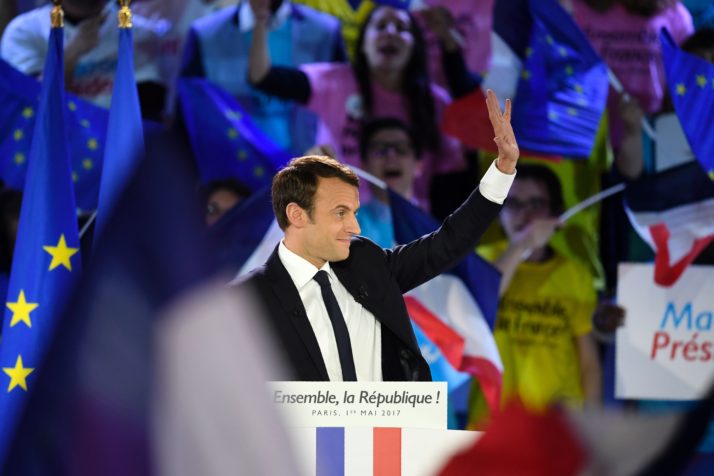Macron Win Is Bad for Putin, Good for Team Merkel on World Stage

EghtesadOnline: The standard bearers for liberal democracy and global free trade were quick to welcome Emmanuel Macron as France’s next president, and there’s already one likely loser on the international stage: Russia.
With German Chancellor Angela Merkel gaining the 39-year-old as a team member, President Vladimir Putin will face a re-energized front in Berlin and Paris as he seeks to expand Russia’s influence in Europe and end sanctions over military intervention in Ukraine.
“Vladimir Putin emerges as loser and perhaps a serious loser in this election,” said Daniel Fried, a former U.S. assistant secretary of state for Europe and Eurasia. “It was clear that Putin’s preferred candidate lost and lost decisively.”
According to Bloomberg, Macron also joins like-minded world leaders as they try to manage an unpredictable U.S. President Donald Trump on the global circuit of G-7, G-20 and NATO summits. His addition could prove uncomfortable for Trump, too. Macron has promoted his own “buy Europe” campaign that could bump up against the U.S. administration’s trade agenda.
Macron ran as the candidate of change, “but he didn’t run on a ticket of nostalgia and nationalism,” said Fried. “So he now stands as an immediate counterweight to Trump intellectually and ideologically.”
Russian Stance
In contrast to defeated nationalist Marine Le Pen, France under Macron looks set to back the European Union, help safeguard the euro and maintain his country’s position in NATO. More concretely, his election program committed to continue economic sanctions against Russia until it complies with the terms of the 2014 Minsk peace agreement. Le Pen had said she would lift them.
Russia and its leader were open in their support of Le Pen. A Russian bank gave her party a 9 million-euro ($9.9 million) loan in 2014, when French banks would not.
During the presidential election campaign this year Putin met her in Moscow, allowing Le Pen to argue she would be better able to talk to Russia and Trump, as president, than her rivals. Russia’s state controlled media, meanwhile, lavished personal attacks on Macron, including questioning his sexuality.
Most recently, suspicion yet again fell on Russian hackers for the mass leak of emails from the Macron campaign team on the eve of the vote, as cyber analysts found indications the hack came from Russian language computers. No connection with Russia has been confirmed and the Kremlin has repeatedly denied any connection with such hacks, including in the U.S.
Confidence Boost
Macron’s decisive win will bring a welcome boost of confidence for defenders of the “old’’ postwar liberal order -- and the institutions that underpin it -- after a year that produced the dual shocks of Britain’s vote to leave the EU and Trump.
“The world now knows where France will stand,” said Simon Fraser, who retired as the U.K. foreign service’s top diplomat last year and now runs a consultancy, Flint Global. “Le Pen was the opposite for all these things. Frankly had she won, it would have been a very serious problem for the international system that these institutions represent.”
As global leaders congratulated Macron, Trump said in a phone call he wanted to work closely with the new French president on confronting “shared challenges.” Putin sent a telegram, saying it’s important for countries to overcome “mutual mistrust” and join forces for international security, according to the Kremlin.
Leaders of the 28 NATO member states will meet in Brussels on May 25. Then G-7 leaders -- including Merkel, Canadian Prime Minister Justin Trudeau, and the premiers of Italy, Japan and the U.K. -- are due to convene in Sicily the following day.
International Baptism
Both events will carry added significance, and not just because they mark a quick international baptism for Macron.
They’re expected to mark the first time Trump has sat down collectively with traditional U.S. allies. Until now, they have had to make do with his vice president and national security team to reassure them that much of what Trump said before his own inauguration in January -- about the obsolescence of NATO and EU, protectionism or legitimizing Russia’s annexation of Crimea -- is not U.S. policy.
In July and September, the EU will decide whether to roll over two sets of Russia sanctions for a further six months each. Any one of the EU’s 28 members has the power to block them, making French support for Merkel as she tries to maintain a unified EU front all the more material.
As a February U.K. parliamentary report found, EU support for the sanctions regime has been fraying lately. Trump’s ambivalence encouraged several members -- including Austria and Bulgaria -- to press the case for lifting them.
Get Ready
Yet Macron’s arrival also guarantees nothing, according to Jeffrey Gedmin, a non-resident senior fellow at the Atlantic Council, a Washington think tank.
Macron might have to temper his pro-EU and pro-trade enthusiasm knowing that some 40 percent of French voters chose candidates who advocated isolationism in the first round. In addition, the strength of his domestic political mandate, an important currency in international diplomacy, will be decided by next month’s parliamentary elections.
What’s more, supporters of the U.S.-Europe alliance won’t be able to count on cooperation from an unpredictable American president when it comes to the risks facing their world, said Gedmin. Russia plays over a longer horizon and can wait for another opportunity to splt the EU over sanctions, while the last has not been heard from China, Iran or North Korea, he said.
“Yes it’s a short term win for the transatlantic team, but they still have the populists nipping at their heels and restive publics,’’ said Gedmin. “At a certain point, the world is going to come at us and we will see how in fact, Merkel, Macron and Trump deal with it. They’d better be ready.”


